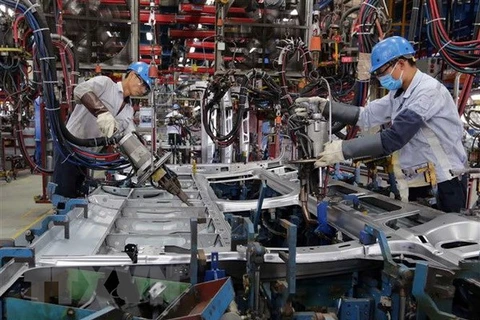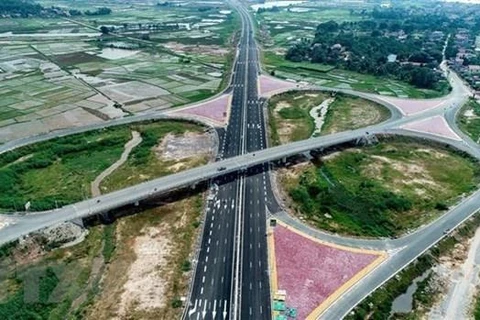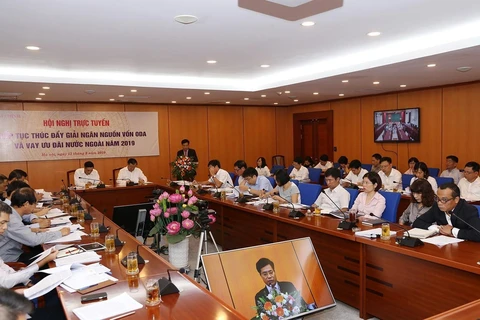 Nguyen Ngoc Phuong, a deputy of Quang Binh province, talks to the media on the sidelines of the National Assembly’s session (Photo: VietnamPlus)
Nguyen Ngoc Phuong, a deputy of Quang Binh province, talks to the media on the sidelines of the National Assembly’s session (Photo: VietnamPlus) Hanoi (VNA) – Sluggish disbursement of public investment capital will hamper the implementation of projects, and particularly, businesses that borrowed from banks will be seriously affected, a legislator has said.
As part of its 8th session, the National Assembly held a plenary meeting on October 30 to discuss the outcomes of the implementation of the socio-economic development and State budget plans for 2019, along with the plans for 2020.
On the sidelines of the event, Nguyen Ngoc Phuong, member of the Party Committee and deputy head of the National Assembly deputies’ delegation of Quang Binh province, shared his opinions about the disbursement of public investment capital.
- The Government recently issued a resolution to speed up the allocation of public investment capital. What do you think about the recent disbursement situation?
Mr. Nguyen Ngoc Phuong: Public investment capital has been disbursed slowly not only in 2019 but for many years. The Government estimated that since the beginning of this year, only 49 percent of the planned public investment capital has been disbursed. The rate is even 19 – 20 percent in some projects. This has hindered socio-economic development, while many structures, projects haven’t been carried out on schedule.
The Government attributed the problem to the slow capital allocation and obstacles in site clearance. However, I have studied this issue for many years and repeatedly pointed out that there are still many procedures for the implementation of a project, especially foreign invested ones. It may take from one to two years at the soonest before a project could be carried out, and some projects may need up to three years.
Besides, unexpected issues may also appear during project implementation, and to make adjustments to those projects, many more procedures must be supplemented which will be time-consuming, usually from six months to one year or even more.
Another reason is that at present, many legal documents and decrees are not consistent, deterring relevant authorities, particularly persons who directly handle projects, from making decisions.
Previously, all competent agencies in provinces dared to act and dared to hold responsibility, but recently they have become more reluctant as they worry that if they did anything wrong and inspection and auditing agencies discovered, they could be prosecuted.
In particular, some documents and decrees seek opinions of too many sectors. For example, when a project is planned to be implemented in a province, authorities will have to collect opinions from the communal to district levels and from the district to provincial levels. After that, provincial authorities will collect opinions from all local sectors and then the managerial agency. When decisions on the project are made, the ministry in charge of the field that project will operate in will submit it to the Government, which in turn will gather opinions of all ministries and sectors before making final decisions.
Additionally, some organisations and individuals still cause difficulties for businesses and projects. Even when a project is being carried out, some persons may still demand adjustments, not once but for many times.
- According you, how does slow public investment capital disbursement affect the economy?
Mr. Nguyen Ngoc Phuong: Sluggish disbursement greatly affects the economy. Particularly, it will slow down the implementation of projects, and particularly, businesses that borrowed from banks will be seriously affected. If capital is allocated on schedule, projects will be put into use soon and the State budget revenue will also increase.
Typically, the progress of the high-speed railway project is very slow at present, which has influenced the interests of not only the people and enterprises but also thepeople’s trust in the Government, ministries and sectors.
Apart from infrastructure projects, some hospital and school projects are also carried out at a snail’s pace.
- Are there any solutions to improve ministries and sectors’ sense of responsibility?
Mr. Nguyen Ngoc Phuong: I think it is necessary to reduce procedures for project implementation, amend all laws and decrees to ensure consistent governance, and avoid obstacles for the work.
It is important that all relevant agencies and individuals of each division must not cause difficulties but create the best possible conditions for businesses to carry out their projects.
- Thank you very much!























